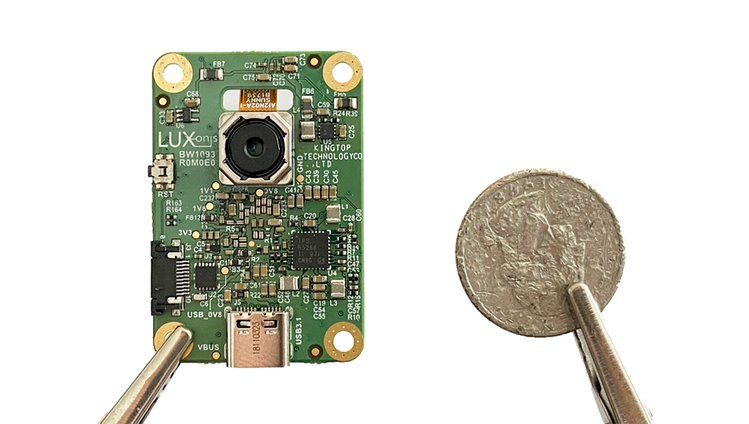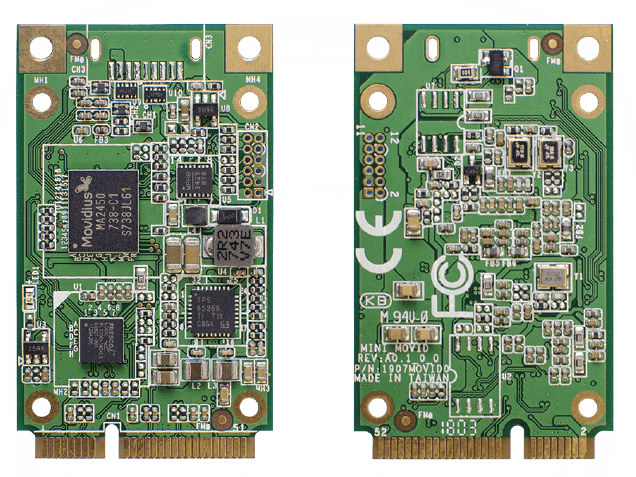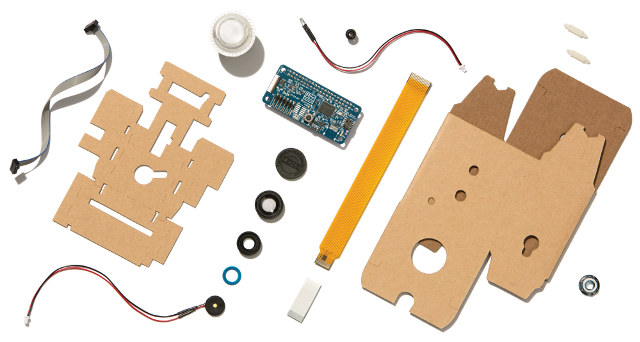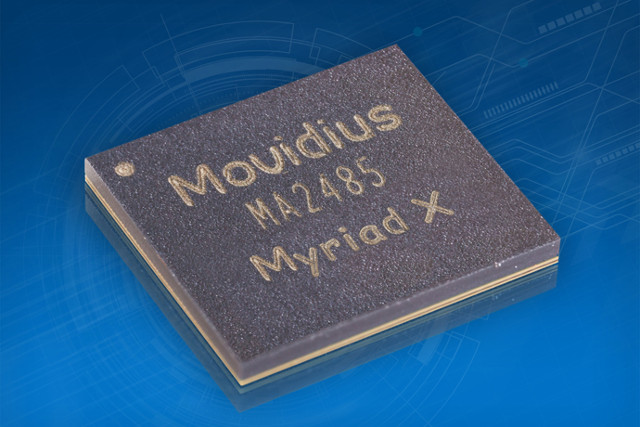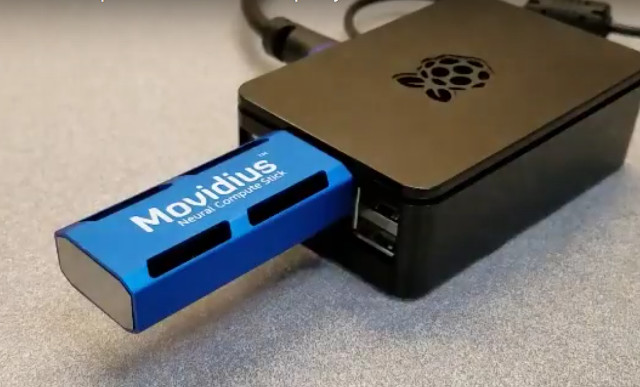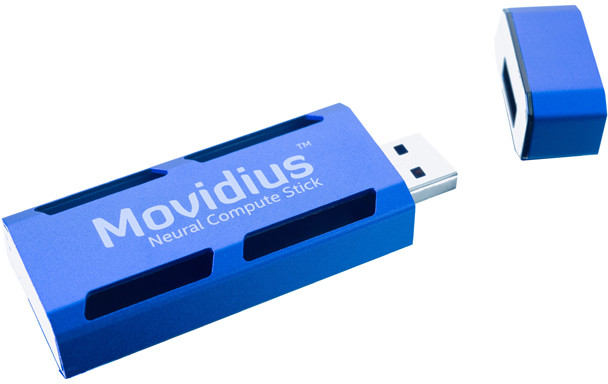megaAI 4K AI camera board reminds me of Kendryte K210 based boards such as Maixduino used for computer vision for tasks such as object tracking or face recognition, but instead of just handling QVGA at around 15 to 18 fps, megaAI can supports inference at 4K resolution up to 30 fps. The tiny board can achieve this feat by leveraging the 4 TOPS of AI processing power delivered by Intel Movidius Myriad X VPU (Vision Processing Unit) while consuming only around 2.5 Watts. megaAI board specifications: AI Accelerator – Intel Movidius Myriad X VPU delivering up to 4 TOPS (Trillion Operations Per Second) Camera – 12 MP 4056×3040 Auto-Focus (8cm-∞) camera with 81 degrees horizontal Field of View (HFOV) Video RAW Output – 4K @ 60FPS or 12MP @ 30FPS (with USB3.1 Gen2 Host) Hardware Image Encoding – 12 MP JPEG encoding Hardware Video Encoding: 4K H.265 encoding at 30 […]
$70 UP AI Core mini PCIe Card Features Intel Movidius Myriad 2, Supports Tensorflow and Caffe Frameworks
AAEON’s Up Board has given us some affordable Intel development boards over the years with products such as the Cherry Trail based UP Board, or Apollo Lake powered UP Squared board among others, that are competitively priced against equivalent Arm development boards. The company has now launched a new UP AI Edge family, which will include hardware based on Intel Altera FPGA or Intel Movidius VPU (Vision Processing Unit). Their first product is based on the latter, more exactly Movidius 2 2450 VPU, and instead of being a standalone board, UP AI Core is a mini PCIe card that can fit into any 64-bit Intel board or computer. UP AI Core card specifications: SoC – Intel Movidius Myriad 2 2450 VPU System Memory – 512MB DDR SDRAM Mini PCIe edge connector Dimensions – 51 x 30 mm Host computer/board requirements System Memory – 1GB RAM or more Storage – 4GB […]
$45 AIY Vision Kit Adds Accelerated Computer Vision to Raspberry Pi Zero W Board
AIY Projects is an initiative launched by Google that aims to bring do-it yourself artificial intelligence to the maker community by providing affordable development kits to get started with the technology. The first project was AIY Projects Voice Kit, that basically transformed Raspberry Pi 3 board into a Google Home device by adding the necessary hardware to support Google Assistant SDK, and an enclosure. The company has now launched another maker kit with AIY Project Vision Kit that adds a HAT board powered by Intel/Movidius Myriad 2 VPU to Raspberry Pi Zero W, in order to accelerate image & objects recognition using TensorFlow’s machine learning models. The kit includes the following items: Vision Bonnet accessory board powered by Myriad 2 VPU (MA2450) 2x 11mm plastic standoffs 24mm RGB arcade button and nut 1x Privacy LED 1x LED bezel 1x 1/4/20 flanged nut Lens, lens washer, and lens magnet 50 mil […]
Intel Introduces Movidius Myriad X Vision Processing Unit with Dedicated Neural Compute Engine
Intel has just announced the third generation of Movidius Video Processing Units (VPU) with Myriad X VPU, which the company claims is the world’s first SoC shipping with a dedicated Neural Compute Engine for accelerating deep learning inferences at the edge, and giving devices the ability to see, understand and react to their environments in real time. Movidius Myraid X VPU key features: Neural Compute Engine – Dedicated on-chip accelerator for deep neural networks delivering over 1 trillion operations per second of DNN inferencing performance (based on peak floating-point computational throughput). 16x programmable 128-bit VLIW Vector Processors (SHAVE cores) optimized for computer vision workloads. 16x configurable MIPI Lanes – Connect up to 8 HD resolution RGB cameras for up to 700 million pixels per second of image signal processing throughput. 20x vision hardware accelerators to perform tasks such as optical flow and stereo depth. On-chip Memory – 2.5 MB homogeneous […]
Movidius Neural Compute Stick Shown to Boost Deep Learning Performance by about 3 Times on Raspberry Pi 3 Board
Intel recently launched Movidius Neural Compute Stick (MvNCS)for low power USB based deep learning applications such as object recognition, and after some initial confusions, we could confirm the Neural stick could also be used on ARM based platforms such as the Raspberry Pi 3. Kochi Nakamura, who wrote the code for GPU accelerated object recognition on the Raspberry Pi 3 board, got hold of one sample in order to compare the performance between GPU and MvNCS acceleration. His first attempt was quite confusing as with GoogLeNet, Raspberry Pi 3 + MvNCS achieved an average inference time of about 560ms, against 320 ms while using VideoCore IV GPU in RPi3 board. But then it was discovered that the “stream_infer.py” demo would only use one core out of the 12 VLIW 128-bit vector SHAVE processors in Intel’s Movidius Myriad 2 VPU, and after enabling all those 12 cores instead of just one, […]
Intel’s Movidius Neural Compute Stick Supports Raspberry Pi 3 Board
Last month, Intel introduced Movidius Neural Computer Stick to accelerate applications such as object recognition, and do so offline, i.e. without the cloud, and at low power. While there was not that much information available at the time, the minimal requirements for the host machine were that it had to be a x86_64 computer running Ubuntu 16.04, and come with at least 1GB RAM, and 4GB storage. So I understood the stick would only work attached with 64-bit Intel or AMD processors, and ARM development boards would not be an option. But today, I’ve found that Movidius had uploaded a new video showing a Python based object recognition demo with the Neural Compute Stick connected to the the Raspberry Pi 3 board. You just need to add a USB camera, copy ncapi directory from the SDK installed on your Ubuntu 16.04 development machine to the Debian Jessie installed on RPi 3 […]
Intel’s Movidius Neural Compute Stick Brings Low Power Deep Learning & Artificial Intelligence Offline
Intel has released several Compute Stick over the years which can be used as tiny Windows or Linux computer connected to the HDMI port of your TV or monitor, but Movidius Neural Computer Stick is a complete different beast, as it’s a deep learning inference kit and self-contained artificial intelligence (A.I.) accelerator that connects to the USB port of computers or laptops. Intel did not provide the full hardware specifications for the kit, but we do know the following specifications: Vision Processing Unit – Intel Movidius Myriad 2 VPU with 12 VLIW 128-bit vector SHAVE processors @ 600 MHz optimized for machine vision, Configurable hardware accelerators for image and vision processing; 28nm HPC process node; up to 100 gigaflops USB 3.0 type A port Power Consumption – Low power, the SoC has a 1W power profile Dimensions – 72.5mm x 27mm x 14mm You can enter a trained Caffe, feed-forward […]


